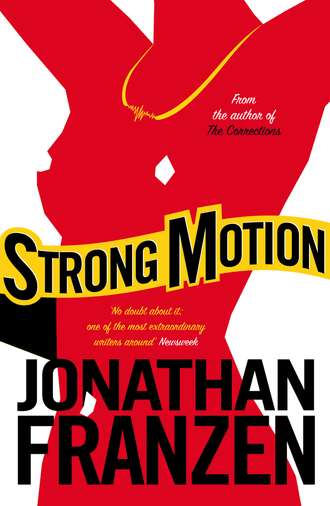
Полная версия
Strong Motion
On Friday night, once the Ipswich police had finished with him on the telephone and he’d driven back to Somerville, he called Eileen. “You won’t believe what I just saw on the news,” Eileen said. What she’d just seen via live minicam was the ambulance that held their step-grandmother’s body. Eileen thought she’d felt the earthquake without knowing it while she was studying. She’d thought it was trucks. She said it was the second little earthquake she’d felt in Boston in two years.
Louis said he hadn’t felt it.
Eileen said their parents were flying into town on Sunday, because of Rita’s death, and staying in a hotel.
Louis said, “They’re spending money on a hotel?”
In the morning he went to the corner drugstore to buy newspapers. It had been raining all night and the rain clouds looked unspent, but the sky had brightened for a moment and the fluorescent light inside the drugstore was the same color and intensity as the light outside. The Saturday Herald had printed on its cover:
EARTH- QUAKE!
DESTRUCTION AND DEATH IN IPSWICH
New Age Guru A Victim
The earthquake had also made the front page of the Globe (TREMOR ROCKS CAPE ANN; ONE DEAD), which Louis began to read as he headed home again. Absorbed, he was late in noticing a tall old man in a cardigan and unbuckled rubber boots who was rubbing his four-door American-made brogue with a hand towel. Spotting Louis, he stepped out to block the sidewalk. “Reading the paper, are ya?”
Louis did not deny it.
“John,” the old man goggled. “John Mullins. I see you live next door here, I saw you movin’ in. I live on the first floor right here, lived here twenty-three years. I was born in Somerville. John’s the name. John Mullins.”
“Louis Holland.”
“Louis? Lou? You mind if I call you Lou? You reading about the earthquake there.” Suddenly the old man might have bitten a lemon or a rotten egg; he made a face like the damned. “Terrible about that old woman. Terrible. I felt it, you know. I was at the Foodmaster, you know, round the corner here, it’s a good store. You shop there? Good store, but what was I, what was I … I was sayin’ I felt it. I thought it was me. I thought it was nerves, you know. But I was watching the news and wooncha know, it was a temblor. That’s what they call it, you know, a temblor. Thank God it wasn’t any worse. Thank God. What are you, a student?”
“No,” Louis said slowly. “I’m in radio. I work for a radio station.”
“Lot of students live around here. Tuff students mainly. It’s right up the street. They’re not bad kids. What do you think? You like it around here? You like Somerville? I think you’ll like it. I tell you I felt that earthquake?”
John Mullins hit himself in the forehead. “Sure I did. Sure I did.” The encounter was evidently becoming too much for him. “All right, Lou.” He squeezed Louis’s shoulder and stumbled towards his car.
As Louis went inside he heard his soprano neighbor’s arpeggios commencing, the fundamentals being struck on the piano in a rising chromatic scale. He sat down on the bare floor of his room and opened the papers. “Drat it,” he distinctly heard John Mullins say to some other neighbor. “They said it wasn’t going to rain anymore.”
Neither the Globe nor the Herald could quite hide its delight at having a death—Rita Kernaghan’s—to justify big headlines for a small local temblor. The shock, with a magnitude of 4.7 and an epicenter just southeast of Ipswich, had occurred at 4:48 p.m. and lasted less than ten seconds. Property damage had been so insignificant that a photograph of an Ipswich man fingering a crack in his breakfast-room wall received a prominent enlargement in both papers. Being the higher-brow paper of the two, the Globe also ran boxed articles about the history of earthquakes in Boston, the history of earthquakes, and the history of Boston, including a special graphic time line revealing (among other things) that the last two significant tremors to shake the city had coincided with the end of Henry Cabot Lodge, Jr.’s second term as U.S. senator (1944) and the end of his third (1953).
Another box on page 16 contained an update on the doings of a Protestant minister by the name of Philip Stites, who according to the Globe had six months earlier moved his Church of Action in Christ up to Boston from Fayetteville, North Carolina, with the stated intention of “eliminating abortion in the Commonwealth.” Stites’s followers were attacking fetal murder by standing at the doors of clinics. On Friday evening people of conscience from thirty-one states and possessions had marched to the third in a series of protest rallies in downtown Boston; in a subsequent television interview Stites said the earthquake had come close to striking “the epicenter of butchery,” by which he meant the Massachusetts State House. God (he let it be inferred) was angry with the Commonwealth. Like the Church of Action in Christ, He would not rest until the slaughter of the unborn had ceased. “Look for me everywhere,” Stites said.
“I was at the Foodmaster,” John Mullins said above the rain and arpeggios. “I thought it was the old nerves.”
Victim Was a Writer
Rita Damiano Kernaghan, whose death was the only one reported in yesterday’s earthquake in Ipswich, was a popular lecturer on the local New Age circuit and the author of three books on inspirational topics. She was 68 years old.
Kernaghan was perhaps best known for the battle she and the Town of Ipswich had waged since 1986 concerning the pyramidal structure she erected on the roof of her home, a farmhouse built within the town limits of Ipswich in 1765 and enlarged in 1623 under the direction of George Stonemarsh, a leading post-Revolutionary era architect.
In 1987 the Ipswich Town Meeting conceded that a clerical error had resulted in the granting of a building permit for the pyramid, and acted to retroactively enforce the local landmarks-preservation code and ordered the removal of the pyramid. Kernaghan sued the town in 1988 and later refused an out-of-court settlement under which the town would have paid the cost of removing the pyramid and restoring the house to its original 1823 design.
Kernaghan maintained that her right to build the pyramid —a geometrical form held by some to exert healing and preservative influences—is a First Amendment issue, rooted in the separation of church and state. The case, still unresolved, has become a cause celebre in the north-suburban New Age community.
Kernaghan, whose printed works include “Beginning Life at 60,” “Star Children,” and the recently published “Princess of Italy,” was the widow of Boston attorney John Alfred Kernaghan. She is survived by a step-daughter, Melanie Holland of Cleveland.
Higher and higher the soprano’s fundamentals rose, a slow upward spiral of hysteria. Louis was frowning, his pinky on the bridge of his glasses, his fingertips on his hairline, his thumb on his jaw. The thing he couldn’t stop looking at was his mother’s name. Not because the Globe had stuck her in Cleveland but for the name’s sheer personal resonant presence in print on paper. Melanie Holland: this was his mother, peculiarly reduced. Two words in a Boston paper.
Still frowning, and also beginning now to shiver, as if when the raindrops hit the windowpanes behind him their chill came right on through, he looked again at the boxed article about the Reverend Philip Stites. “Up Tremont Street” it said, “and across the Common to the steps of the State House.” The facts were consistent with what Louis himself had seen of the march—con sistent in a deep way, because the article, like memory, like dreams, reduced the event to an idea, illuminated not by twilight and streetlight but by its own light, in the darkness of his head: he saw it because he knew that this was what had happened, because he knew that this was how things had been. And therefore it seemed to him that it could only be raining this morning. The rain had to be there to make this day different, to bar any return to yesterday afternoon and the particular conditions of atmosphere and light through which those marchers had been marching, the blue northern clarity of light in greater Boston when the earthquake struck. The rain made the morning real, so unshakably present that it was hard to believe there’d even been an earthquake; to believe the accidents had occurred anywhere but on paper.
Stacked against one wall of the bedroom were his cartons of radio equipment, which he’d faithfully shipped from Evanston to Houston and from Houston to Boston and never unpacked. He worked his fingernail under the duct tape holding the top carton closed. Strength failed him. He staggered to his futon, one foot slipping on the open Globe, crashed heavily and lay face down until long after the arpeggios had stopped.
Sunday night he had dinner with his family in a fish restaurant on the harbor. He was surprised to hear that his mother and Eileen took it for granted that Rita Kernaghan had fallen to her death less because an earthquake shoved her than because she was blind drunk at the time. Then again, they’d known her and he hadn’t. The word was she’d fallen off a barstool, which sounded like a joke in bad taste but was apparently the literal truth. She was being cremated privately on Wednesday morning, her ashes hurled from a pier in Rockport on the afternoon of same, and her life celebrated the next day at a memorial service that Louis was expected to take time off from work to attend. His mother, obviously impatient with the whole deceased-disposal process, referred to the service as “the thing on Thursday.”
It wasn’t until shortly before “the thing” that he saw his parents again. He’d done Dan Drexel’s board work until ten in the morning, and then, possibly a little hurt that his mother hadn’t planned any other get-togethers or shown any interest in where he lived and worked (“hurt,” however, maybe not the word for his feelings towards a family in which people rarely had the resources to take or fake a personal interest in anyone’s life but their own, “regret” or “bitterness” or “general sadness” maybe being more like it), drove straight to their hotel, a newish medium-rise by the river in Cambridge, just off Harvard Square. It would later transpire that his mother had made his father spend two afternoons in Widener Library so they could write off his half of the trip. Outside their door, at the end of a hushed hallway, Louis raised his hand but didn’t knock. He lowered it again.
“Eileen, that’s not the point.”
“Well, what is the point.”
“The point is to show some consideration for my feelings and try to understand things from my side. This has been an extremely upsetting—Yes! Yes!—an extremely upsetting week! So you might at least have had the consideration to wait—”
“You’re happy she’s dead! You’re happy!”
“That’s a very muffle muffle muffle to any person, muffle your mother. A very un-Christian thing.”
“It’s true”
“I have to get dressed now.”
“It’s true. You’re happy!”
“I must get dressed. Although I can’t help wondering—well, muffle muffle muffle a young man who would put his casual girlfriend—”
“His what?!” Eileen’s high voice went twice as high. “His casual girlfriend up to—”
“His—!? What are you talking about? This has nothing to do with Peter. And for your information—”
“Oh Eileen.”
“For your information—”
Here Louis, with a gesture of disgust, threw his fist against the door a couple times. Eileen let him in. Tears had muddied her eyeliner.
“Who is it?” their mother said from behind the bathroom door.
“It’s Louis,” Eileen said grimly.
“Hi Louis, I’m dressing.”
Eileen retreated towards the window, which looked out over the river at her business school. She was wearing the same bulky sweater she’d had on the last time Louis saw her. Today it looked as if she’d been sleeping in it.
“Where’s Dad?” Louis said.
“He’s at the pool. What are you doing here so early?”
Louis thought a moment. “What are you doing here so early?”
She made a ghastly teenaged face at him, tongue and gums showing, and turned to face the window. Louis scratched his ear thoughtfully. Then, shifting gears, he prowled, he snooped. On one of the hotel room’s many luggage surfaces, lying like junk mail amid car keys and open Trident packages, he found a pair of official-looking documents, a police report and a medical examiner’s report, the back sides of which his mother had been using to jot down names and phone numbers. He looked at the official sides while Eileen carefully rubbed the skin around her eyes and their mother punctuated long bathroom silences with dressing and grooming noises. The police report consisted principally of the testimony of Rita Kernaghan’s live-in Hainan maid, Thérèse Mougère.
At 15:45 on April 6 Mougère completed her afternoon duties and placed inside her reticule three oranges and a ladies novel in French. She was scheduled to drive the deceased to downtown Boston at 17:00. She stated that the novel was for reading in the parking garage. As Mougère was granted from 16:00 to 17:00 every afternoon to watch television she retired at approximately 15:50 to her room which is down a short hall to the rear of the kitchen. The deceased was speaking on the kitchen telephone when Mougère last saw her alive. Shortly before the end of her program (it was established that the program was “Star Trek” which ends at 16:58) the house began to shake. The windows of Mougère’s room rattled and one pane broke. Mougère heard “a booming.” The lights flickered and the television faded for a moment. Mougère went to the kitchen where vases had fallen from the table and the cabinet doors were open. In the dining room a plate and vases had fallen from the breakfront. Mougère went to the parlor. Small articles had fallen from tables and there was a smell of whiskey from behind the bar. Mougère went upstairs calling the deceased’s name. Hearing nothing she became alarmed and searched all the upstairs rooms. She searched the parlor again and encountered the body of the deceased behind the bar. Blood, broken glass and a large volume of whiskey were present. A barstool was on its side. Mougère called the police. Dobbs and Akins arrived at 17:35. It was established that Mougère had not disturbed the body. When it was surmised that the deceased had fallen from the barstool while taking down a bottle Mougère averred that she habitually placed the deceased’s favorite labels of whiskey on a high shelf to discourage consumption. Mougère volunteered that a familiar spirit named Jack inhabited the house and had caused the death and destruction. This and other supernatural theories were discounted. The death appears to have been accidental in nature, in all probability occasioned by the moderate earthquake at 16:48. Questions regarding Mou-gère’s illegal residence status and the manner in which she obtained a valid Mass. operator’s license were referred to USINS. USINS was advised that the Coroner no longer required Mougère’s presence in the Commonwealth.
More hurriedly, because his mother was now making pre-exit noises in the bathroom (cases snapping, the water tap turned briskly on and off), Louis read through the report of the Essex County medical examiner, which assigned “massive counter-coup trauma” as the cause of death and attributed this trauma to an accident wherein the deceased, who was 62” tall, had fallen from a 38” barstool, resulting in a total drop of 100 inches, a fall sufficient, in combination with the marble floor, to flatten the left frontal portion of the skull and immediately terminate all brain activity. Blood loss from lacerations caused by broken glass was dismissed as a factor. The blood-alcohol content of the deceased was 0.06 percent, equivalent to “moderate” intoxication.
Louis covered up the document with a paperback and turned around. His mother was emerging from the bathroom.
It was obvious that she’d been spending money. Spending money and (so it seemed to Louis) sleeping, for she looked approximately fifteen years younger than she’d looked at dinner on Sunday. The skin of her face was golden and glowing and so tautly attached to her jawline it seemed to pull her dark eyes open wide. She’d had her hair set in a short pageboy—and colored also? What Louis remembered as an even dark gray had been resolved into black and silver. She was wearing a pale yellow linen dress with black velvet trim, the hem about an inch above the knee. The high collar was joined with a brooch that contained a nickel-sized pearl. At the mirror, nostrils flared in concentration, she touched invisible and possibly nonexistent hairs around her temples. Then she went to the closet and with the exact same fluidity of vertical motion that Eileen had inherited, dropped to her knees and drew a shoe box from a plastic Ferragamo bag.
“You’re lookin’ nice there, Mom.”
“Thank you, Louis. Isn’t your father back yet?”
With raised eyebrows he watched her remove a pair of shoes from a bed of crimson tissue paper. He turned to Eileen, wondering if she too might raise her eyebrows at this spectacle of a mom transformed by sudden spending power. But Eileen was no less transformed. With eyes pinkened by hurt and hate and a face in which every muscle had gone dead she watched their mother slip her small feet into a pair of shoes as sleek as Jaguars. No way Louis could catch her eye. She needed to have her sorrows noticed by their mother, not by him. So while she suffered by the window (cold rain falling between her and the business school) and their mother complacently fitted a pair of white roses into the black band of a floppy white hat, he sat down on the bed and opened the sports section of a handy Globe. It could almost as easily have been he and not his sister suffering by the window, but what is a pack dog thinking, what’s going on behind its yellow eyes, when it sees one of its fellows taken aside by a polar explorer to have its throat slit and be made into supper for its siblings?
“Your father’s going to have about three minutes to shower and dress,” their mother said. “Maybe one of you could—”
“No,” Eileen said.
“No,” Louis said. Their father swam in earplugs and goggles and had to be physically prodded to leave a pool.
“Well.” Their mother stood up with her hat on, flattened her dress across her hips, and spun around once on her toes. “How do I look?”
There was a silence, Eileen not even glancing.
“Like a million bucks,” Louis said.
“Ha ha ha!” Eileen cawed mirthlessly.
Their mother, without expression, began to reload a newlooking black clutch. “Louis,” she said. “I’m going to have to talk to you.”
“Yeah, well, I already heard it,” Eileen said, stamping across the room. “So I’ll see you guys at the service.” She pulled her raincoat from a hanger and opened the door and reeled back before their father, who, towel around his waist and goggles nestled in the sodden gray fluff below his throat, was advancing like an interested lobster, saying to Eileen, “Well, if it ain’t the Infanta Elena! Dark star of Aragon! Keepress of the emerald scepter!” She swung back into clothes hangers, her fingers splayed and rigid near her ears, while the lobster gathered her waist in the crook of its stout claw. She shied writhingly. “Don’t! Don’t! Don’t! Oh, you’re still wet!” Color was returning to her cheeks. Her father kissed one and released her, saluted across the room to Louis, and disappeared into the bathroom. Their mother had witnessed none of this.
Fifteen minutes later the four Hollands were sitting in the parental rented two-door Mercury, Melanie at the wheel, the kids in back. The kids’ cars had stayed behind in the hotel lot because Bob Holland considered automobiles an abomination and had threatened to walk if they took more than one. Louis was folded together like a card table and incipiently carsick, with his under-insulated head against a cold fogged window and the taste of heavy rain and diesel exhaust in his throat. On his shins he held his mother’s hat. Someone who was not Louis and probably not Eileen was farting steadily. Bob, looking diminished in a thirty-year-old suit, was glaring out his window at overtaken drivers in the heavy midmorning traffic on Memorial Drive. He thought that driving a car was an act of personal immorality.
Louis pushed out the hinged rear window and put his nose and mouth against the flat surface of the cooler air outside. He was beginning to relate his carsickness to flatten the left frontal portion of the skull and immediately terminate all brain activity, the imagination of death having advanced covertly and autonomously, penetrating his consciousness only now. He managed to suck a fortifying breath of air in through the window. “Do you think she knew it was an earthquake?”
Eileen gave him an ugly, morose look and retreated within herself.
“Who?” Melanie said.
“You know. Rita. Do you think she knew the shaking was an earthquake?”
“It sounds,” Melanie said, “as if she was far too inebriated to think much of anything.”
“It’s kind of sad,” Louis said, “don’t you think?”
“There are worse ways to go. Better this than cirrhosis in a hospital bed.”
“She’s left you all this money. Don’t you think it’s kind of sad?”
“She didn’t leave me any money. She didn’t leave me anything but a quarter of a million dollars in illegally secured debts, if you want to know the truth.”
“Oh come on, Mel.”
“Well, she did, Bob. She had a mortgage on a house that didn’t belong to her. The bank in Ipswich was unaware of this little fact, which—”
“Your mother’s father,” Bob said, “left everything he had in a trust—”
“Bob, this doesn’t interest Louis.”
“Sure it does,” Louis said.
“And it’s not particularly his business either.”
“Oh, well.”
“But the basic point,” Melanie continued, “is that by the time my father died he had a very clear idea of the kind of woman he’d taken for a second wife, and while he had a duty to leave her comfortable he also didn’t want her to fritter away an estate that he eventually wanted to go to his children—”
Bob barked with delight. “Meaning he didn’t leave your mother a cent! And not a cent to your Aunt Heidi either! He wrote exactly the kind of spiteful, arrogant, dead-handed, lawyer’s lawyer will you’d have expected from him. Everybody beggared, everybody bitter, and a committee of three lawyers from the Bank of Boston meeting twice a year to write themselves checks on the fund.”
“I like the way you honor the dead.”
“Could you open a window a little?”
“And Mel’s going to right a few wrongs now, isn’t she? See, Lou, after Heidi died it all came to devolve on your mother. It was supposed to go to the surviving daughters. Your mother’s in exactly the same position your grandfather was ten years ago. Only the rich have gotten richer, haven’t they? Your mother’s in a position to build some schools and clinics, maybe give a gym to Wellesley. Or help the homeless, huh, Mel?”
Melanie tilted her head back, removing herself from the discussion. Eileen smiled bitterly. Louis asked again to have a window opened.
The memorial service, which was to have been held in a meadow in Essex County if the sun had shone, had been shifted to the ballroom of the Royal Sonesta, a luxury hotel overlooking the mouth of the Charles at the extreme northeast corner of Cambridge. For a moment, when Louis followed his parents through the doorway, he thought they’d entered the wrong room; milling in sad social lumps were, it seemed to him, the very people he’d seen marching against abortion on Tremont Street a week earlier—the same inflexible middle-aged female faces, the same smattering of vacant-eyed men, the same curtain-colored clothing and sensible shoes. But then, alerted by the beeline Eileen was making, he saw Peter Stoorhuys.








